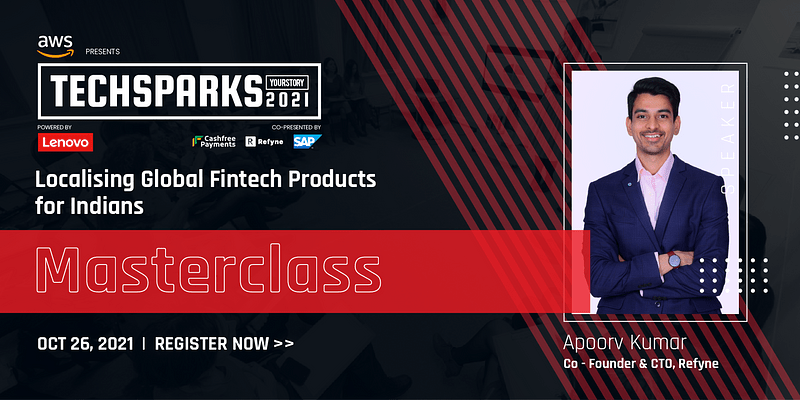Build for one, configure for all: Refyne’s Apoorv Kumar on how startups can localise global fintech products for India
To explain how startups could customise global fintech solutions for the Indian masses, Apoorv Kumar, Co-founder and CTO, Refyne hosted a masterclass at YourStory's TechSparks 2021.
Processing transactions worth $285 billion annually, US-based digital payments player PayPal is among the top fintech companies in the world. It launched its operations in India in 2017 amidst a lot of buzz in the market. Incidentally, the company decided to wind up its operations in the country in February 2021.
At the same time, India-born fintech startup which had a humble start in 2010 is now headed for an IPO. Backed by Japan’s Softbank and China’s Alibaba, Paytm’s IPO size is valued at around $2.5 billion.
The two instances may indicate two very different success stories, but for Apoorv Kumar, Co-founder and CTO, , they highlight why several international fintech ventures fail by replicating a globalised model, rather than ‘localising’ it.
During an insightful masterclass at TechSparks 2021 — YourStory’s flagship technology, innovation and leadership summit — Apoorv deep-dived into why standard product design strategies don’t work for India and how fintech ventures could localise global fintech products for Indians.
Refyne is an earned wage access (EWA) platform that enables professionals, both salaried and contractors, to track and access a portion of their real-time pay any time before payday. The app offers a flexible financial solution to employees and limits their dependence on short-term borrowings that often push them into debt traps.

Solving for volume and variety
For most fintech product managers, the go-to mantra for designing a solution is — empathise, define, ideate, prototype and test. “However, as many developers and product managers in Silicon Valley realised, the process isn’t as simple as it looks. For them, design thinking can’t always be linear and the process should be more agile to pave the way for detours and reviews,” said Apoorv.
Volume and variety are the two key challenges that most product designers encounter while building for Indian users. “We have a user base of over 1 billion and all of them come from diverse identities. They speak different languages, are of different ages, have varying incomes and have different levels of digital and financial literacy. Not to forget, regulatory guidelines are also constantly changing and might hamper the innovative solution that you’ve built,” he stated.
In other words, building a fintech solution for India is like playing three-dimensional chess. Every identity you add increases the complexity of your solution exponentially.
And what’s the solution? “To build a solution that has the ability to customise at scale. You build for one, but configure for all,” explained Apoorv.
The Refyne team took an early bet on Flutter, an open-source UI software development kit developed by Google, to manoeuvre its way through glitches in customer experiences and rolling out multi-tenant versions of its solution.
“Flutter makes it easy to build solutions for low-spec devices. Our developers are very happy with the tooling and documentation they get with it. Plus, it stacks well on parameters like productivity, cross-platform performance and industry adoption,” he added.
How to manage lingual localisation
Apoorv believes that developers need to weave in multi-lingual support for users right from the start. “For robust multi-lingual support, you need to have experts that can create the colloquial equivalent of your content. Moreover, once the app is created, you would want the content to be reviewed by a native speaker to give your users a consistent experience, especially pages which feature costs and figures,” he said.
Also, app developers should ensure that their users have customer support available in the language of their choice. Hence, the backend support should be able to understand the users’ language preference. “But be careful to avoid over localising your content. For instance, words like ‘SMS’ or ‘salary’ are well accepted across languages and you don’t need to translate them,” he cautioned.
One needs to avoid jargon and complex sentences and prefer icons or visual aids to convey relevant information.
“Cramming too much content on a page only confuses a user. At Refyne, we have a very heavy bias towards giving a user a single action per page. We depend heavily on user feedback and A/B testing to guide us,” added Apoorv.
Growth metrics
In a trust-sensitive sector like finance, even a 1 percent failure rate can cost an enterprise. "Ideally, if you have set a performance metric to gauge your level of success, it should be achieved for 99 percentile of the users. For instance, the time taken for an app to load a page is a performance target,” he shared.
"Google recommends that your system gives a user feedback within 1.8 seconds of a request, be it loading a page or pulling data from the backend. Anything above 8 seconds is considered poor user experience. So, ideally you would want all your page loads to happen within that 3-second window," said Apoorv.
Innovating at scale to match India’s scale
Apoorv said that it’s important for a fintech solution to match India’s scale so that it doesn’t end up being a victim of its own success. “Going from 50k users to 500k users is a very real possibility in India. Hence, your system should be able to scale seamlessly 5-10x every six months,” he stated.
To keep its systems scalable and reliable, Refyne leverages AWS’ cloud-based infrastructure that promises high productivity with low redundancy. “We use architectures that are event-driven and are compatible with microservices architectures that can be easily scaled up or down. Refyne also leverages frameworks that are built for high concurrency,” shared Apoorv.
To log in to our virtual events platform and experience TechSparks 2021 with thousands of other startup-tech enthusiasts from around the world, join here. Don't forget to tag #TechSparks2021 when you share your experience, learnings and favourite moments from TechSparks 2021.
For a line-up of all the action-packed sessions at YourStory's flagship startup-tech conference, check out TechSparks 2021 website.














